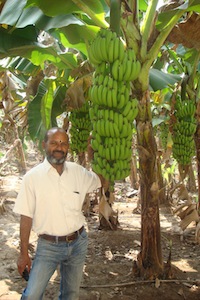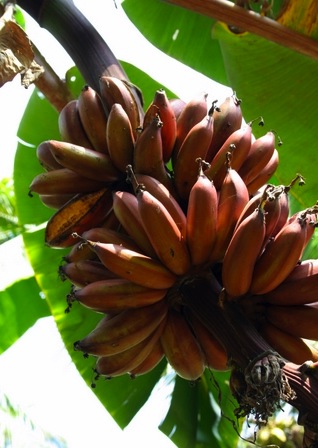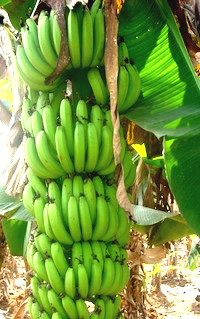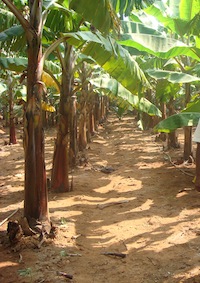Farmer’s practices
Package of practices for Banana cultivation
Seed availability : Suckers, Tissue culture plants
Season and Varieties
- Mostly planting during October — February.
- Poovan, Nendran, Kadhali, G.9, Red Banana, Karpooravalli, Mondhan, Rasthali, Hill Banana (Recently cultivation started in plains)
Varietal characters
- Poovan, Karpooravalli, Rasthali, Kadhali are traditional varieties used only for functions and consumed as fruits
- Red Banana: Cultivation area is less adopted as it takes long duration to harvest
- G.9: Widely grown on all soils and marketable in whole country.
- Nendran: Though it's a traditional variety its widely used as chips, baby foods and consumed as fruits
So he choosed Red Banana, Nendran, G.9 for his regular cultivation. |
 |
Special characters and observation by the farmer
Nendran
More of phosphorus loving crop the bunches will emerge in 180 days and ready to harvest in 270 days and in 300 days harvest will be completed. This variety is not adviceable for ratoon crop. It is widespread used as chips, which are exported to abroad, the fruit is dried and used as baby foods as fruits also.
Grand Nine
More of nitrogen loving crop. The bunches will emerge in 157 days and ready for harvest in 250 days and the harvest will be completed in 300 days. This is mainly consumed as fruits. This crop is suitable for ratoon.
Crop management —Land preparation
The field is ploughed by using fine with deep reverse plough, sickle plough and 5 tines implement plough. The soil is ploughed to get fine tilth powdery in nature. The last ploughing was done with nine-tine plough. Di Ammonium Phosphate (DAP) and potash was applied as basal.
Spacing and Crop geometry
Grand Nine tissues culture plants, Nendran tissues Culture plants, red - banana tissue culture plants.
- Grand Nine and Nendran: 6 x 6m at 1200 plants / Acre
- Red Banana: 8 x 8m at 700 plants / Acre
- 1 x 1 x 1 feet size pit was taken and tissue culture plants are planted in this pit.
Water Management
The crop field was laid with inline drip system with 16mm lateral and 2lph. Tissue culture plants are planted in the pit and irrigation was done immediately after planting @ 4 litres per plant. During early stages of the growth up to one month, the crop needs very less water on alternate day basis. Average water requirement for banana plant is 18 litre / plant /day. Irrigate the field depending upon the moisture condition of the soil.
Integrated Nutrient Management
The fertigation should be done through Ventury system using water-soluble fertilizers. The fertilizers are given in alternate days to effectively use the available nutrients to promote the fast and vigorous growth of the plant. Fertigation is started from 31 day after planting. To maintain the oil organic matter farmyard manure and poultry manure is applied @ 2 kg per plant on 21st day after planting. Four grades of fertilizers are used according to the need of the nutrients to the plants from time to time.
Fertigation Schedule for Nendran banana
| Spacing = 1.8 * 1.8 m |
Nendran Banana |
| Stage |
Duration
(Days) |
Fertilizer
Form |
125:90:300 g N P K/ plant |
| (kg/ac/day) |
Total Qty
(kg/ac) |
| 15-45 |
30 |
MAP (12:61:0) |
1.67 |
50 |
Polyfeed
(19:19:19)
(19:19:19) |
1.50 |
45 |
| 46-105 |
60 |
MAP (12:61:0) |
1.67 |
100 |
| Polyfeed (19:19:19) |
0.83 |
50 |
| Urea (46:00:00) |
0.67 |
40 |
| 106-180 |
75 |
PF (19:19:19) |
0.33 |
25 |
| Multi-K (13:00:45) |
4.00 |
300 |
| Urea (46:00:00) |
1.07 |
80 |
| 181-240 |
60 |
Multi-K
(00:00:50) |
1.67 |
100 |
| SOP (13:00:45) |
5.88 |
353 |
| Urea (46:00:00) |
0.37 |
22 |
|
|
Fertigation Schedule for Red banana
Spacing = 1.8 * 1.8 m |
Red Banana |
| Stage |
Duration
(Days) |
Fertilizer
Form |
150:100:350 g N P K/ plant |
| (kg/ac/day) |
Total Qty
(kg/ac) |
| 15-45 |
30 |
MAP (12:61:0) |
2.33 |
70 |
Polyfeed
(19:19:19)
(19:19:19) |
1.50 |
45 |
| 46-105 |
60 |
MAP (12:61:0) |
1.67 |
100 |
| Polyfeed (19:19:19) |
0.83 |
50 |
| Urea (46:00:00) |
0.67 |
40 |
| 106-180 |
75 |
PF (19:19:19) |
0.33 |
25 |
| Multi-K (13:00:45) |
5.33 |
400 |
| Urea (46:00:00) |
1.33 |
100 |
| 181-240 |
60 |
Multi-K
(00:00:50) |
1.67 |
100 |
| SOP (13:00:45) |
6.53 |
392 |
| Urea (46:00:00) |
0.63 |
38 |
|
 |
Fertigation Schedule for Different types of Grand Nine banana
Spacing = 1.8 * 1.8 m |
G9 |
| Stage |
Duration
(Days) |
Fertilizer
Form |
150:80:350 g NPK/ plant |
| (kg/ac/day) |
Total Qty
(kg / ac) |
| 15-45 |
30 |
MAP (12:61:0) |
1.73 |
52 |
Polyfeed
(19:19:19) |
1.67 |
50 |
| 46-105 |
60 |
MAP (12:61:0) |
1.25 |
75 |
Polyfeed
(19:19:19) |
0.83 |
50 |
| Urea (46:00:00) |
0.67 |
40 |
| 106-180 |
75 |
PF (19:19:19) |
0.33 |
25 |
Multi-K
(13:00:45) |
5.33 |
400 |
| Urea (46:00:00) |
1.33 |
100 |
Multi-K
(00:00:50) |
1.67 |
100 |
| 181-240 |
60 |
SOP (13:00:45) |
6.50 |
390 |
| Urea (46:00:00) |
0.80 |
48 |
|
 |
Weed Management
Weed Management is not at all a big problem. The liquid Azosphyrillum, Phosphobacteria and Humic acid are used to enhance the soil fertility and also to increase the micro- organisms in the soil. It helps to increase the uptake of nutrients to the root surface. He has not used any weedicide. Weeds are removed by hand weeding with the help of minimum labours. Mini tractors or power tillers can be used for weeding.
Integrated Pest and Disease Management
The soil is maintained with the application of organic inputs like farmyard manure, poultry manure and humic acids etc. Trichoderma viride, pseudomonus, organic NPK liquid are given to the crop to resistant to pest and diseases and also to increase the vigour. As a precautionary measure when the climate changes from summer to monsoon season in our area, copper-oxy-chloride and Bavistin are used to control the yellowing of leaves.
Harvesting
Harvesting is done by labours, which engaged by local banana trader.
Yield
- Grand Nine - Average yield 35kg/bunch
- Red banana - Average yield 24kg/bunch
- Nendran - Average yield 18kg/bunch
|

Weed free banana field |
Updated on : March 2015 |




